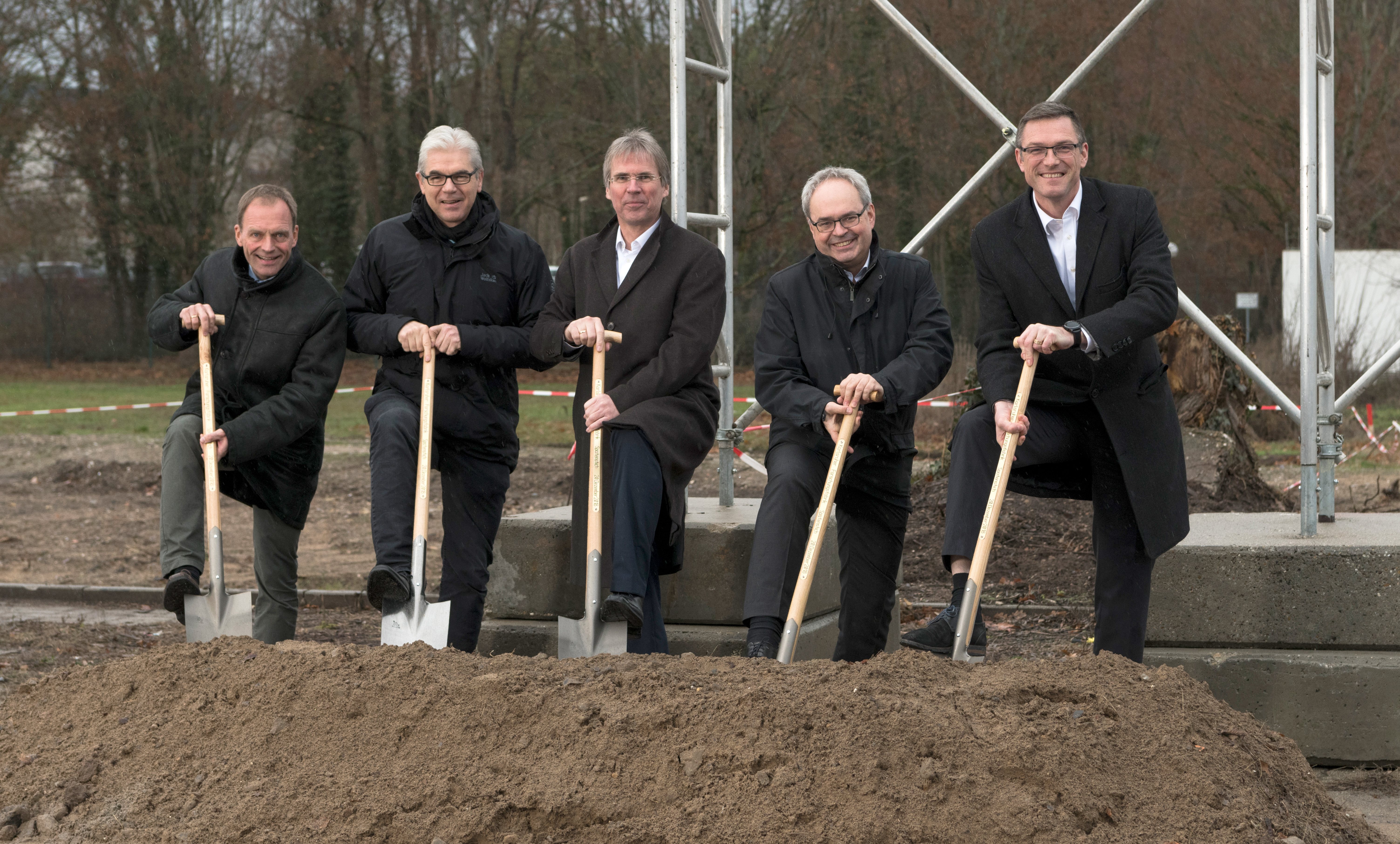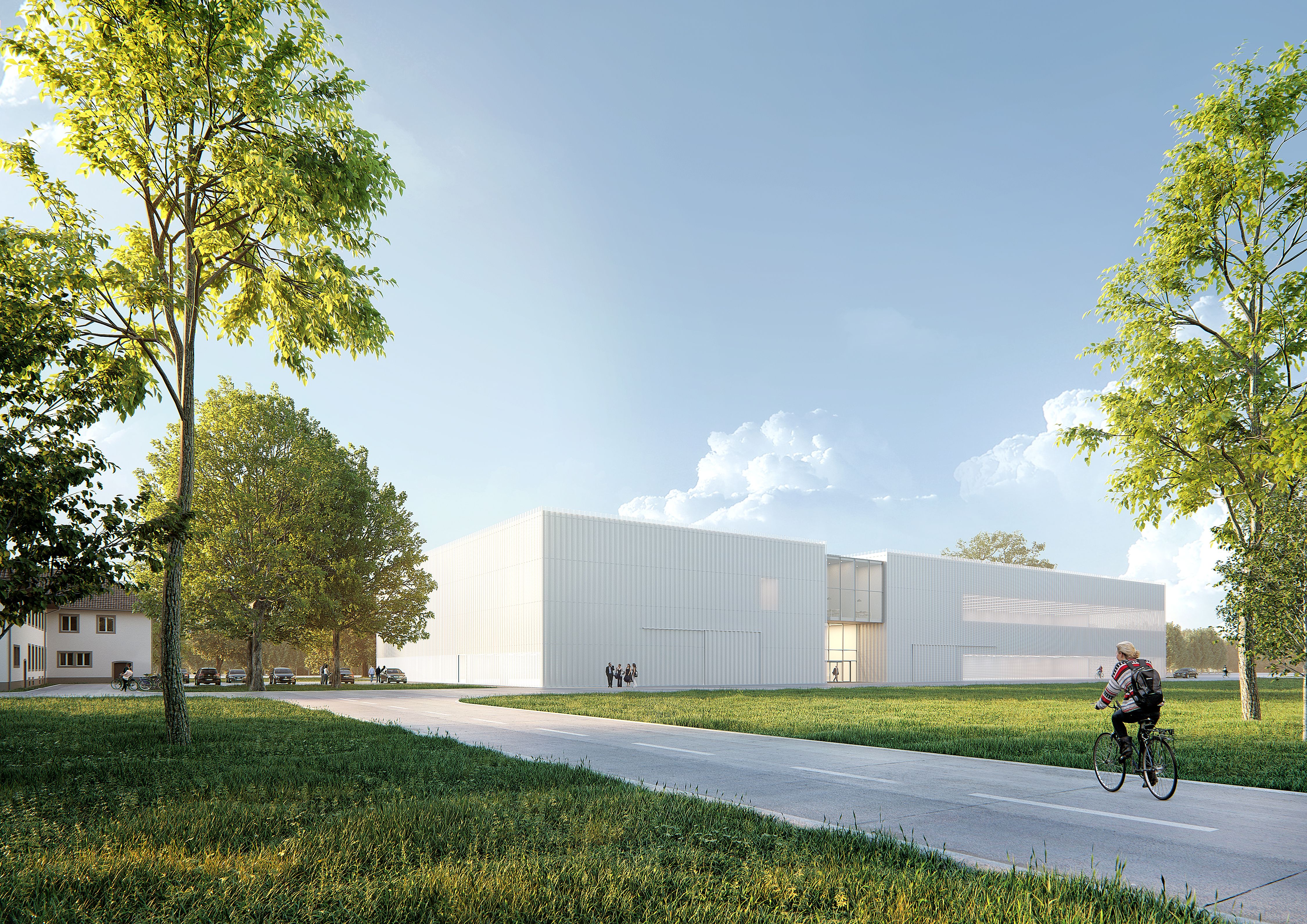KIT and Fraunhofer Establish Development and Demonstration Center for the Factory of the Future - Reference Project for Federal AI Strategy
With the joint ground-breaking ceremony of the cooperation partners Karlsruhe Institute of Technology (KIT) and Fraunhofer-Gesellschaft, the "Karlsruhe Research Factory" started construction work at the end of December. From the end of 2020, new production technologies are to be planned, tested, and transferred to industry in the 15-million-strong facility on KIT Campus East much faster than before, using state-of-the-art digitization methods. The project will make an important contribution to the recently adopted "Artificial Intelligence Strategy" of the Federal Government and is considered significant for the innovative strength of Germany as a business location.


Germany owes much of its prosperity to its ability to bring innovative products quickly and repeatedly to the world market. The manufacture of these products must constantly reinvent itself in an age of global competition, digitization and artificial intelligence. On the one hand, to maintain scientific and technological advantages over competitors and imitators. On the other hand, in order to survive in the field of tension between new technologies, complex production processes, increasing individualization and extreme variant diversity. Against the background of this challenge, the KIT with its wbk Institute for Production Engineering and the Fraunhofer-Gesellschaft with its Institutes for Chemical Technology ICT and for Optronics, Systems Engineering, and Image Exploitation IOSB have agreed to build the Karlsruhe Research Factory on the East Campus of the KIT.
Making immature production processes ready for series production at a new speed - this is the program of the Karlsruhe Research Factory currently under construction. (Fig.: KIT)
"The Karlsruhe Research Factory is the model case of interdisciplinary cooperation between strong partners for the benefit of the vital innovation capability of our country," says Professor Holger Hanselka, President of the Karlsruhe Institute of Technology. "By integrating small and medium-sized companies into the research factory at an early stage," says Hanselka, "we are also strengthening the attractiveness of the city and region.
Dr. Raoul Klingner, Director of Research of the Fraunhofer-Gesellschaft, says: "We are pleased to contribute our special strength in application-oriented research to this close cooperation with the KIT - both in the fields of materials, production, and process engineering and in automation, sensor, and information technology".
Objective and scientific approach
The goal of the Karlsruhe Research Factory is to systematically develop and expand advances in new, challenging manufacturing processes. The scientists want to learn how to manufacture high-quality products at a very early stage - i.e. when the manufacturing processes required for a new product are not yet fully understood and mastered. With the help of state-of-the-art measurement, sensor and control technology, they want to develop methods that are suitable for quickly transforming new production technologies into safe and profitable industrial manufacturing processes. Production can start very early on in this process, because intelligent process controls ensure that the first, qualitatively perfect product specimens are produced despite the still immature production technologies.
In concrete terms, this happens as follows: Machine learning and artificial intelligence processes use the data collected by sensors to detect correlations between quality-related data and process parameters. In this way, the production plant already in operation "learns" which parameters produce good results. The declared goal of the research factory actors is to apply machine learning and artificial intelligence not only to individual production steps or directly successive processes, but to record and improve entire process chains.
This significantly reduced "time-to-market" should enable small and medium-sized companies in particular to be present in the target markets with new products much earlier than before. The participating institutes wbk (KIT), ICT and IOSB (Fraunhofer) combine those competences in production, manufacturing and process engineering as well as in automation, sensor and information technology that are necessary to implement this scientifically demanding objective. Application fields of the research factory are electromobility and lightweight construction, but also other innovative fields for which intelligent and economical production technology must be established with Industry 4.0 and AI methods.
"The rapid industrialization of new, innovative production technologies is essential for strengthening Germany as a production location," emphasizes Professor Jürgen Fleischer, head of the wbk Institute for Production Technology at KIT and head of the wbk section for machines, plants, and process automation. "The unique selling point of the Karlsruhe Research Factory is the interdisciplinary cooperation of production research, automation technology, and information technology under one roof.
Professor Frank Henning, deputy head of the Fraunhofer ICT and holder of the chair for lightweight construction technology at the KIT Institute for Vehicle System Technology, sees "interdisciplinarity and the efficient use of process data in complex processes as the key to sustainable production in Germany as a business location.
Professor Jürgen Beyerer, head of the Fraunhofer IOSB and holder of the Chair for Interactive Real-Time Systems at the KIT Institute for Anthropomatics, points out another unique selling point of the research factory: "The combination of comprehensive sensor technology and the evaluation of the data obtained with it, including methods of machine learning and their comprehensible visualization, is decisive. On this basis, immature production processes can be explored, understood and optimized in a much more targeted manner than is possible today".
"The research factory and the methods and tools of machine learning and the targeted search for process parameters to be developed there are a first manifestation of the goals formulated in the current AI strategy of the Federal Government," explains Dr. Olaf Sauer, who as deputy director of the institute at the IOSB coordinates the planning of the Karlsruhe research factory on the part of the Fraunhofer-Gesellschaft.
Cooperation with industrial partners
The methodology of rapid industrialization of new production technologies to be developed at the Karlsruhe Research Factory promises to give the numerous innovative small and medium-sized companies in Baden-Württemberg decisive advantages in global competition. In order to transfer results quickly and in a targeted manner, interested companies should therefore be involved right from the start - through close cooperation, joint projects and workshops. At the same time, KIT and Fraunhofer assume that the research factory with its attractive working conditions for employees in the applied research environment will contribute in the long run to building and maintaining the innovative leadership of the Karlsruhe Technology Region in materials, production, and information technology. Furthermore, the research factory is connected to the coming generation of engineers through the teaching at the wbk Institute for Production Technology.
Key data on the construction of the research factory
The Karlsruhe research factory will be located on the KIT East Campus. A total budget of about 15 million euros is planned for the implementation of the construction measure. The cooperation partners KIT and Fraunhofer each contribute half of this amount; in addition, investments in the initial equipment of the production halls, laboratories, and offices will be made. After laying the foundation stone in summer 2019, the L-shaped building will accommodate about 70 scientists on two floors and an area of 4,500 square meters from the end of 2020. It will also provide 50 workplaces for cooperation partners from industry. The opening is scheduled for the end of 2020.
The "Karlsruher Forschungsfabrik" project is funded by the German Federal Ministry of Education and Research, the Ministry of Science, Research and the Arts Baden-Württemberg, the Ministry of Economics, Labor and Housing Baden-Württemberg and the European Fund for Regional Development.
Last modified:
 Fraunhofer Institute of Optronics, System Technologies and Image Exploitation IOSB
Fraunhofer Institute of Optronics, System Technologies and Image Exploitation IOSB